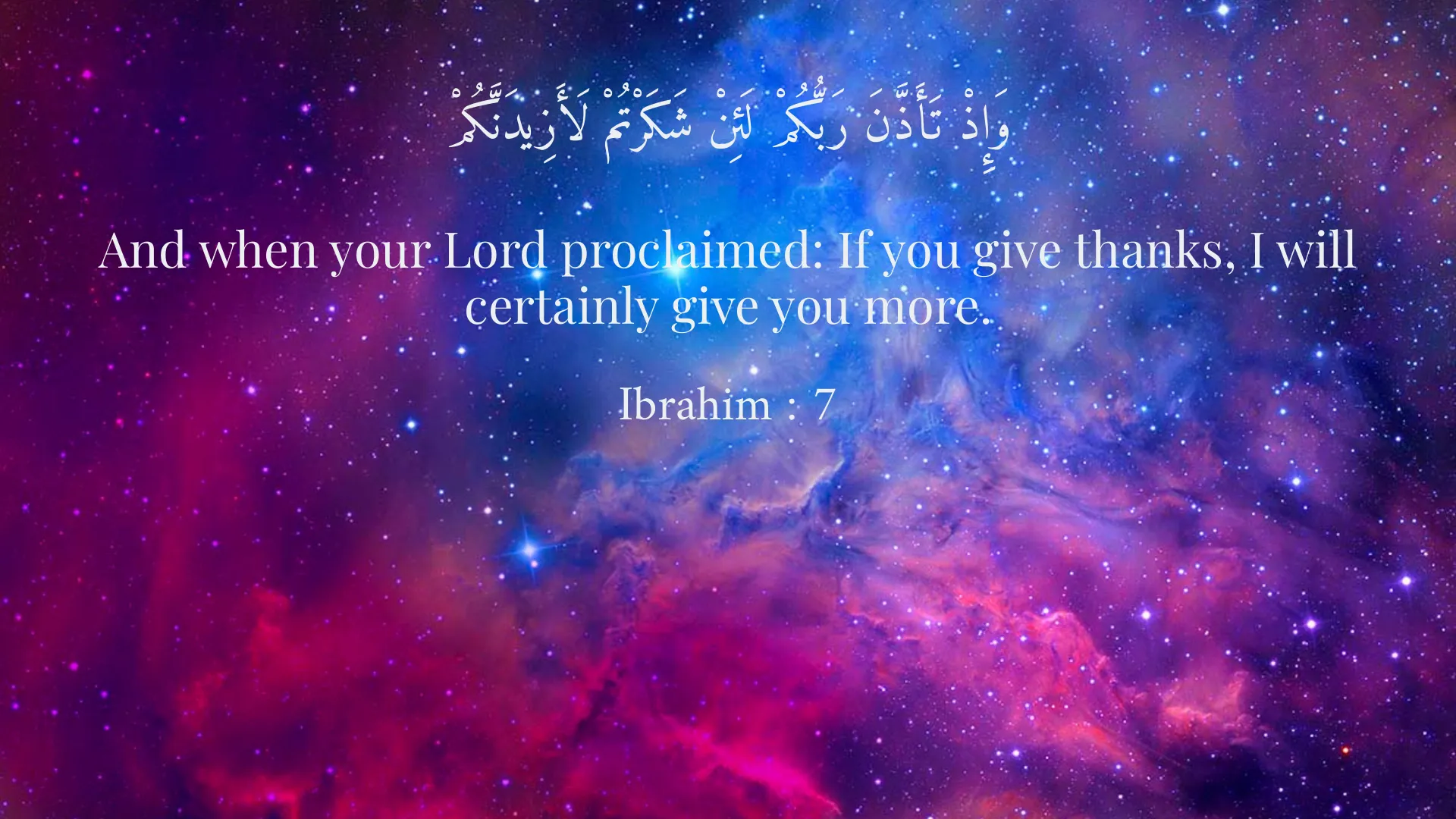Quranic Answer

Gratitude is a fundamental concept that underpins many cultures and religions, but it holds a particularly significant place in the teachings of the Holy Quran. Within its verses, gratitude is not merely a polite response to benefits received; it is portrayed as a profound spiritual act with both worldly and otherworldly implications. One compelling verse that encapsulates the essence of gratitude is found in Surah Ibrahim, verse 7, where Allah states: "And when your Lord proclaimed: If you give thanks, I will certainly give you more." This powerful declaration underscores the reciprocal relationship between human gratitude and divine generosity. From a theological perspective, the act of expressing gratitude is intrinsically linked to faith. It forms the bedrock of a believer's relationship with Allah. By acknowledging the blessings bestowed upon us, we reinforce our recognition of Allah's mercy and favors. This acknowledgment is vital as it grounds us in the reality that our existence and the joys within it are gifts from a higher power. According to Islamic teachings, recognizing these gifts fosters contentment and awareness, essential qualities that nourish the soul. The verse further implies that gratitude will yield an increase in blessings. This can be interpreted on multiple levels; for instance, it suggests that a grateful heart is open and receptive, making one more likely to notice and appreciate the myriad blessings in their life. Conversely, when one fails to express gratitude, there’s a risk of becoming complacent or discontent, as life's blessings may go unrecognized and unappreciated. It is through gratitude that we can cultivate a mindset of abundance, rather than scarcity. When life showers us with gifts—be it in the form of health, family, friendship, or prosperity—gratitude serves as a reminder that we should not take these realities for granted. The discipline of expressing thanks aids us in recognizing that all good things originate from Allah. By holding a space of gratitude in our hearts, we keep our consciousness aligned with the fact that we are in constant need of His guidance and mercy. This act of mindfulness is not just spiritual but can also have psychological benefits, enhancing our overall well-being. Expanding further on the concept of gratitude, we turn to Surah Az-Zumar, verse 66, where Allah instructs us to believe in Him and to express our gratefulness. This directive highlights the relational nature of gratitude; it is not performed in isolation but rather as a part of our relationship with Allah and our fellow humans. Gratitude, therefore, becomes a bridge connecting us to both the divine and the community around us. In our daily lives, gratitude can be expressed in myriad ways. Reciting the Quran is one profound method of expressing thankfulness. Each verse contains wisdom and guidance, allowing us to reflect on the many facets of life and the Universe. Additionally, making prayers or supplications is an intimate way to connect with Allah, wherein we can directly express our gratitude for His blessings. Through prayer, we acknowledge our dependence on Him, and simultaneously, we invite more blessings into our lives by affirming our thankfulness. Moreover, performing good deeds for others, a core principle in Islam, is another essential avenue for expressing gratitude. Engaging in acts of kindness not only benefits the recipient but also reinforces our understanding of the interconnectedness of all human beings. Good deeds aligned with gratitude cultivate a spirit of generosity and selflessness, further enriching our own lives. Being grateful is not always easy, particularly during challenging times when negativity can cloud our perspective. However, it is precisely during these moments that cultivating gratitude is most crucial. In different phases of life, whether we are experiencing joy or struggle, the commitment to express gratitude can transform our mindset. Training ourselves to find something to be thankful for—even amidst difficulties—encourages resilience and fortitude. Instilling gratitude in our lives requires intention and practice. The determination to acknowledge and express thankfulness is vital. Setting aside moments for reflection, journaling about our blessings, and engaging in meaningful conversations about gratitude can help solidify this practice. This introspection naturally leads us to a deeper understanding of our lives and our places in the world. In conclusion, gratitude serves as a powerful tool in both our spiritual and daily lives. It is reinforced by divine teachings and offers both immediate and long-term benefits. As we navigate the complexities of life, the remembrance of our blessings and the associated practice of gratitude can serve to ground us, enhance our relationships with Allah, and enable us to live our lives with a spirit of generosity. As believers, let us heed the sacred instruction to give thanks, continually remembering that through gratitude, we open ourselves to receive more of Allah’s abundant blessings.
Related Verses
وَإِذْ تَأَذَّنَ رَبُّكُمْ لَئِنْ شَكَرْتُمْ لَأَزِيدَنَّكُمْ
And when your Lord proclaimed: If you give thanks, I will certainly give you more.
Ibrahim : 7
قُلْ آمِنُوا بِمَا شِئْتُمْ مِّنْهُ أَوْ لا تُؤْمِنُوا ۖ إِنَّ الَّذِينَ أَشْرَفُوا لَا تَحُبُّهُمْ الْإِنسَانُ أَحَدٌ مِّنكُمْ
Say: Believe in whatever you want, or do not believe. Indeed, those who are unjust will not be loved in the hearts of people.
Az-Zumar : 66
Short Story
One day in a beautiful garden, a kind man named Hassan was busy tending to his trees. Every morning, he would start with prayers and express gratitude for the blessings Allah had bestowed upon him. Hassan always reminded himself that every fruit he picked from his tree was a result of his efforts and gratitude. He often taught others that gratitude multiplies blessings and that through kindness, he brought new life to the lives of his family and neighbors.